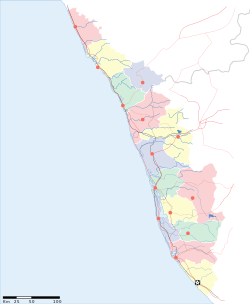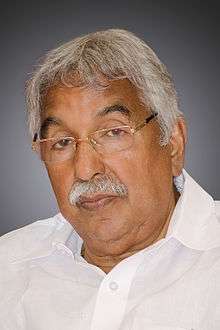List of Chief Ministers of Kerala
| Chief Minister of Kerala | |
|---|---|
| Residence | Cliff House, Nanathancode, Thiruvananthapuram[1] |
| Appointer | Governor of Kerala |
| Inaugural holder | E. M. S. Namboodiripad |
| Formation | 5 April 1957 |
The Chief Minister of Kerala is the chief executive of the south Indian state of Kerala. As per the Constitution of India, the governor is a state's de jure head, but de facto executive authority rests with the chief minister. Following elections to the Kerala Legislative Assembly, the state's governor usually invites the party (or coalition) with a majority of seats to form the government. The governor appoints the chief minister, whose council of ministers are collectively responsible to the assembly. Given that he has the confidence of the assembly, the chief minister's term is for five years and is subject to no term limits.[2]
The origins of Kerala lie in the princely states of Travancore and Cochin and Malabar . Following India's independence from the British Raj in 1947, these states' rulers instituted a measure of representative government, headed by a Premier and his Council of Ministers. On 1 July 1949 Travancore and Cochin were merged to form Travancore-Cochin state. In 1956, the States Reorganisation Act redrew India's map along linguistic lines, and the present-day state of Kerala was born, comprising solely Malayalam-speaking districts.[3] Since 1957, eleven people have served as the Chief Minister of Kerala.[4] The first was E. M. S. Namboodiripad, who headed the world's first democratically elected Communist government.
The incumbent chief minister is the Indian National Congress party's Oommen Chandy, who was sworn in on 18 May 2011.
Premiers of Travancore
| No | Name | Term[5][6] (tenure length) |
Assembly (election) |
Party | |||
|---|---|---|---|---|---|---|---|
| 1 | Pattom A. Thanu Pillai | 24 March 1948 | 17 October 1948 | 210 days | Representative Body (1948–49) | Indian National Congress | |
| 2 | Parur T. K. Narayana Pillai | 22 October 1948 | 1 July 1949 | 253 days | |||
Premiers of Cochin
| No | Name | Term[5] (tenure length) |
Assembly (election) |
Party | |||
|---|---|---|---|---|---|---|---|
| 1 | Panampilly Govinda Menon | 14 August 1947 | 22 October 1947 | 51 days | Sixth Council (1945–48) | None | |
| 2 | T. K. Nair | 27 October 1947 | 20 September 1948 | 334 days | |||
| 3 | E. Ikkanda Warrier | 20 September 1948 | 30 June 1949 | 283 days | Legislative Assembly (1948–49) | ||
Chief Ministers of Travancore-Cochin
After India's independence in 1947, Travancore and Cochin were merged to form Travancore-Cochin on 1 July 1949. On 1 January 1950, Travancore-Cochin was recognised as a state.
| No | Name | Term[5] (tenure length) |
Assembly (election) |
Party[lower-alpha 1] | |||
|---|---|---|---|---|---|---|---|
| 1 | Parur T. K. Narayana Pillai | 1 July 1949 | 1 March 1951 | 1 year, 243 days | First Assembly (1949–51) | Indian National Congress | |
| 2 | C. Kesavan | 3 March 1951 | 12 March 1952 | 1 year, 11 days | |||
| 3 | A. J. John | 12 March 1952 | 16 March 1954 | 2 years, 4 days | Second Assembly (1952–53) (1951 election) | ||
| 4 | Pattom A. Thanu Pillai | 16 March 1954 | 10 February 1955 | 331 days | Third Assembly (1954–56) (1954 election) |
Praja Socialist Party | |
| 5 | Panampilly Govinda Menon | 10 February 1955 | 23 March 1956 | 1 year, 42 days | Indian National Congress | ||
| – | Vacant[lower-alpha 2] (President's rule) |
23 March 1956 | 5 April 1957 | 1 year, 13 days | Dissolved | N/A | |
Chief Ministers of Kerala

The Government of India's 1 November 1956 States Reorganisation Act inaugurated the new Kerala state, incorporating Malabar District, Travancore-Cochin (excluding 4 southern Taluks which were merged with Tamil Nadu), and the taluk of Kasaragod, South Kanara. A new Legislative Assembly was also created, for which elections were held in 1957.
| No[lower-alpha 3] | Name | Term[8][9] (tenure length) |
Assembly[10] (election) |
Party[lower-alpha 1] | |||
|---|---|---|---|---|---|---|---|
| 1 | E. M. S. Namboodiripad | 5 April 1957 | 31 July 1959 | 848 days | First Assembly (1957–59) (1957 election) |
Communist Party of India | |
| – | Vacant[lower-alpha 2] (President's rule) |
31 July 1959 | 22 February 1960 | Dissolved | N/A | ||
| 2 | Pattom A. Thanu Pillai | 22 February 1960 | 26 September 1962 | 583 days | Second Assembly (1960–64) (1960 election) |
Praja Socialist Party | |
| 3 | R. Sankar | 26 September 1962 | 10 September 1964 | 715 days | Indian National Congress | ||
| – | Vacant[lower-alpha 2] (President's rule) |
10 September 1964 | 6 March 1967 | Dissolved | N/A | ||
| (1) | E. M. S. Namboodiripad | 6 March 1967 | 1 November 1969 | 972 days [Total 1820 days] |
Third Assembly (1967–70) (1967 election) |
Communist Party of India (Marxist) | |
| 4 | C. Achutha Menon | 1 November 1969 | 1 August 1970 | 273 days | Communist Party of India | ||
| – | Vacant[lower-alpha 2] (President's rule) |
1 August 1970 | 4 October 1970 | Dissolved | N/A | ||
| (4) | C. Achutha Menon | 4 October 1970 | 25 March 1977 | 2365 days [Total 2638 days] |
Fourth Assembly (1970–77) (1970 election) |
Communist Party of India | |
| 5 | K. Karunakaran | 25 March 1977 | 25 April 1977 | 32 days | Fifth Assembly (1977–79) (1977 election) |
Indian National Congress | |
| 6 | A. K. Antony | 27 April 1977 | 27 October 1978 | 550 days | |||
| 7 | P. K. Vasudevan Nair | 29 October 1978 | 7 October 1979 | 343 days | Communist Party of India | ||
| 8 | C. H. Mohammed Koya | 12 October 1979 | 1 December 1979 | 51 days | Indian Union Muslim League | ||
| – | Vacant[lower-alpha 2] (President's rule) |
1 December 1979 | 25 January 1980 | Dissolved | N/A | ||
| 9 | E. K. Nayanar | 25 January 1980 | 20 October 1981 | 635 days | Sixth Assembly (1980–82) (1980 election) |
Communist Party of India (Marxist) | |
| (5) | K. Karunakaran | 28 December 1981 | 17 March 1982 | 81 days | Indian National Congress | ||
| 24 May 1982 | 25 March 1987 | 1766 days | Seventh Assembly (1982–87) (1982 election) | ||||
| (9) | E. K. Nayanar | 26 March 1987 | 17 June 1991 | 1544 days | Eighth Assembly (1987–91) (1987 election) |
Communist Party of India (Marxist) | |
| (5) | K. Karunakaran | 24 June 1991 | 16 March 1995 | 1361 days [Total 3240 days] |
Ninth Assembly (1991–95) (1991 election) |
Indian National Congress | |
| (6) | A. K. Antony | 22 March 1995 | 9 May 1996 | 415 days | |||
| (9) | E. K. Nayanar | 20 May 1996 | 13 May 2001 | 1820 days [Total 3999 days] |
Tenth Assembly (1996–2001) (1996 election) |
Communist Party of India (Marxist) | |
| (6) | A. K. Antony | 17 May 2001 | 29 August 2004 | 1201 days [Total 2166 days] |
Eleventh Assembly (2001–06) (2001 election) |
Indian National Congress | |
| 10 | Oommen Chandy | 31 August 2004 | 18 May 2006 | 626 days | |||
| 11 | V. S. Achuthanandan | 18 May 2006 | 14 May 2011 | 1822 days | Twelfth Assembly (2006–11) (2006 election) |
Communist Party of India (Marxist) | |
| (10) | Oommen Chandy | 18 May 2011 | Incumbent | 1739 days | Thirteenth Assembly (2011–16) (2011 election) |
Indian National Congress | |
Gallery
-

E. M. S. Namboodiripad
-

Pattom Thanu Pilla
-

R. Shankar
-

C Achutha Menon
-

K. Karunakaran
-

A. K. Antony
-

P. K. Vasudevan Nair
-

C. H. Mohammed Koya
-

E. K. Nayanar
-

Oommen Chandy
-

V. S. Achuthanandan
See also
- Official Biography Chief Ministers, Ministers and Leaders of Opposition in Kerala at niyamasabha.org
- List of current Indian chief ministers
- History of Kerala
- List of Kerala ministers
Notes
Footnotes
- 1 2 This column only names the chief minister's party. The state government he headed may have been a complex coalition of several parties and independents; these are not listed here.
- 1 2 3 4 5 When President's rule is in force in a state, its council of ministers stands dissolved. The office of chief minister thus lies vacant. At times, the legislative assembly also stands dissolved.[7]
- ↑ A number inside brackets indicates that the incumbent has previously held office.
References
- ↑ Official web site of the Government of Kerala, Page on the Chief Minister
- ↑ Durga Das Basu. Introduction to the Constitution of India. 1960. 20th Edition, 2011 Reprint. pp. 241, 245. LexisNexis Butterworths Wadhwa Nagpur. ISBN 978-81-8038-559-9. Note: although the text talks about Indian state governments in general, it applies for the specific case of Kerala as well.
- ↑ World Statesmen.org — Indian states since 1947
- ↑ Government of Kerala — CMs of Kerala
- 1 2 3 Responsible Governments (1947–56). Kerala Legislature. Retrieved on 22 April 2014.
- ↑ http://kerala.gov.in/index.php?option=com_content&view=article&id=3776:history-of-kerala-legislature
- ↑ Amberish K. Diwanji. "A dummy's guide to President's rule". Rediff.com. 15 March 2005.
- ↑ Chief Ministers of Kerala since 1957. Kerala Legislature. Retrieved on 22 April 2014.
- ↑ President's rule in Kerala. Kerala Legislature. Retrieved on 22 April 2014.
- ↑ Duration of Each Assembly. Kerala Legislature. Retrieved on 22 April 2014.
External links
| Wikimedia Commons has media related to Chief ministers of Kerala. |
| ||||||||||||||||||||||||||||||||||||||||||||||||||||||||||||||||||||||||||||||||||||||||||||||||||||||||||||||||||||||||||||||||||
| ||||||||||||||||||||||||||||||||||||||||||||||||||||